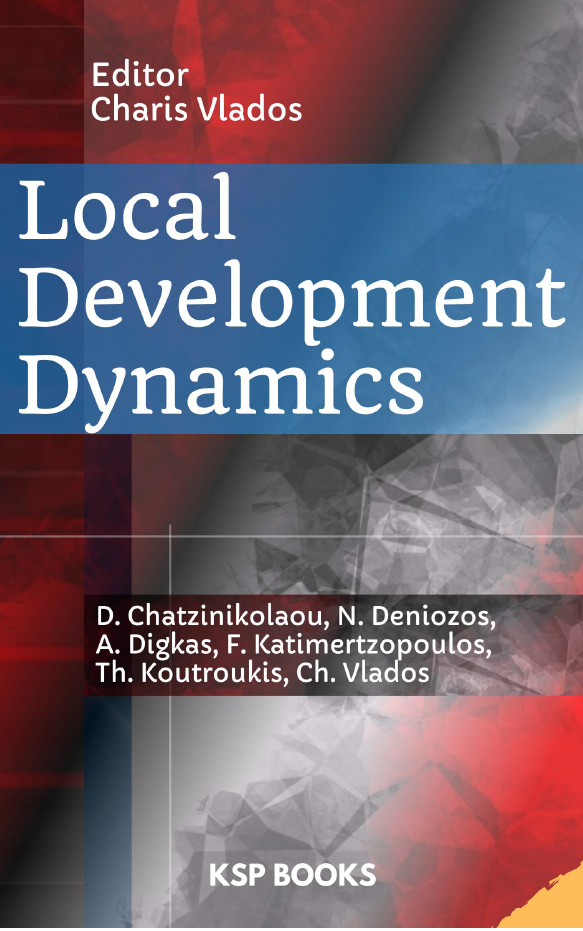This volume—which is a collection of published articles by the “Stra.Tech.Man Lab” research team—focuses on and examines the dynamics of local systems as the principal contributors to overall socioeconomic development. Our goal is to clarify that local development is a phenomenon that goes beyond the traditional regional analysis and the “conventional” neoclassical theorization of maximization; the dynamics of local development seems to belong in the evolutionary socioeconomic science. The evolutionary and trans-disciplinary approach to local development dynamics focuses on the examination of local-level phenomena while seeking to comprehend how local systems (local innovation environments, local business ecosystems, local clusters) shape their potential of innovation and competitiveness. In our perspective, the scientific discipline of local development studies how socioeconomic systems in today’s era of globalization innovate and compete in their different spatial articulations.
In particular, the volume contains four articles:
Local support mechanisms for entrepreneurship: The approach of local development and innovation institutions
The purpose of this article is to examine the innovative potential of small and medium-sized enterprises, which starts primarily from the micro (firm) and meso (globalized sectors of economic activity and business ecosystems in regional configurations) levels of a socioeconomic system. In this context, we argue that a developmental economic policy is inadequate when it focuses exclusively on macro-environmental measures and quantities.
This finding leads us to propose the establishment of Local Development and Innovation Institutions (ILDI), as a repositioned local development policy. These mechanisms could operate in the Greek regions to enhance the innovative capacity of the locally-established firm in a systematic way, especially in the context of the Greek socioeconomic systemic crisis. Besides, we measure through qualitative field research the perception that particular firms are cultivating internally about the need to improve their competitiveness. We find that most firms perceive the necessary changes quasi-totally only in the amelioration of their macro-environment. They do not insist on improving the micro conditions, such as the strengthening of their business culture, their ability to ameliorate their strategic planning aptitudes, their technological potential, and their managerial dexterities. These shortages constitute the basis for these firms’ competitiveness backwardness. We think that this fact underlines the need for specific Greek regions to establish the proposed ILDI mechanism, which could coordinate public and private bodies of the local socioeconomic system (universities, banks, local government, and local firms) by focusing on fostering the innovative potential of local entrepreneurship.
From the traditional regional analysis to the dynamics of local development: Foundations and theoretical reorientations
Next, we present a historical overview of the milestones of regional analysis and compare them with modern approaches to local development dynamics. Specifically, we present the following approaches of regional development: theories based on trade, models based on comparative advantage, theories of developmental stages, theories of technological change, theories of technological change, theories of cyclical fluctuations and techno-financial cycles, neo-Keynesian theories, neo-Marxist uneven development theories, dependency theory, spatial dimension theory of labor, and theories of regulation. Subsequently, we argue that the following approaches to local development dynamics address the phenomenon more thoroughly than traditional regional development. In particular, we examine (i) the multiple political dimensions of local development dynamics, (ii) the evolution of local business systems and clusters, (iii) the production and reproduction of local innovation dynamics, (iv) the aspect of bottom-up development, (v) the structurally reproduced inequality on a local scale, and (vi) the inherently conflicting social character of local development dynamics.
In conclusion, we find out that nowadays, the conventional and traditional regional analysis seems to be gradually changing focus, content, and interpretative perspective. We suggest that the regional analysis of the past seems increasingly saturated and incapable of proposing policy solutions that originate primarily from the potential of local development, innovation, and entrepreneurship. To this end, these mostly multidisciplinary approaches of local development seem to be progressively prevailing, leading the contemporary dialogue of the dynamically evolving localities to the forefront of development economics.
Crisis, innovation, and change management in less-developed local business ecosystems: The case of Eastern Macedonia and Thrace
We present in this research the co-evolving “crisis-innovation-change management” triangle and incorporate it conceptually into a less-developed local/regional business ecosystem. Specifically, we take into account the case study of the region of Eastern Macedonia and Thrace, which is one of the least developed regions in Greece and Europe, and we conduct field research to see how locally-established firms perceive the aspects of the crisis, innovation, and change management. As expected, in less developed local business ecosystems, small firms find it difficult to define these concepts; this fact leads us to assume that this is an obstacle to innovation. The “crisis-innovation-change management” triangle asserts that innovation and the prerequisite mechanisms of change management are strongly necessary for the exit of a structural crisis at all the interdependent levels (local, regional, national, and global). Therefore, we argue that the delay in developmental terms of this particular business ecosystem is justifiable based on how members of local firms perceive the aspect of the socioeconomic crisis, their innovation, and change management.
Strategy perception and implementation on less developed business ecosystems micro and small enterprises: The service sector of Eastern Macedonia and Thrace
Finally, in a similar methodological orientation, we try to identify how micro and small firms in a less-developed local business ecosystem perceive and implement some of the fundamental dimensions of modern strategic planning. We analyze different critical concepts of strategic management and construct a “strategy perception and implementation index,” which consists of 16 corresponding queries. Then, we present field research conducted in micro and small enterprises in the region of Eastern Macedonia and Thrace in Greece. To this end, we find that the “physiologies” of these firms are adjacent to each other since they exhibit similar scores and attributes. We also notice a tendency of these firms to systematize their perception and implementation of strategy since they begin to approach some of the benchmarks set by the international literature of strategic management. However, there is still a significant distance that separates the actual strategic crafting and implementation of these firms and the literature’s standards of the international “best practices.” As a result, based on how these local firms perceive their strategy, we can explain partially the comparatively low local development potential of the region. Besides, with the method proposed in this article, we can analyze, evaluate, and ultimately attempt to reinforce the strategic formulation aptitudes that local firms have, regardless of their particular size and sectoral scope.
 This Book is completely open access. You can freely read, download and share with everyone.
This Book is completely open access. You can freely read, download and share with everyone. 
































